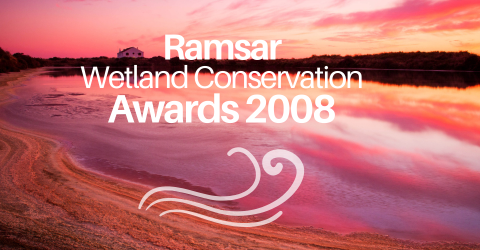
Recognition of Excellence 2008
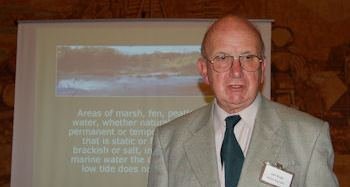
Dr Jan Květ, Czech Republic
Dr Květ is being recognized for his lifetime work and support to wetland conservation and science, as well as for his many contributions to wetland organizations and agreements, including the Convention on Wetlands and the Man and the Biosphere Programme. Here he is interviewed on his career and his thoughts about wetland conservation by Ms. Libuše Vlasáková of the Department of International Conservation of Biodiversity, Czech Ministry of Environment, who is the Ramsar national focal point for the Czech Republic.
---Interview with Jan Květ---
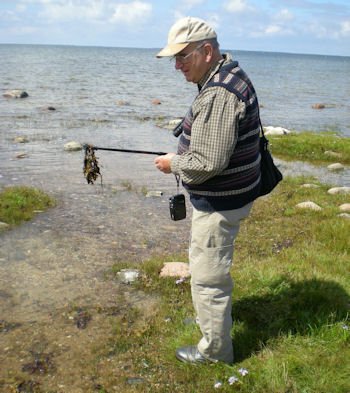
Good morning. By way of background, could you tell me where your interest in wetlands comes from?
It was a gradual process. The topic of my M.Sc. thesis at the Prague Charles University (studies in 1951-56) was “Biological Effects of Peat andSphagnum”. When collecting samples from about 8 mires in Czechoslovakia, I learned to know wetland conditions for the first time in my life. Then, a gap in my interest in wetlands came, because my Ph.D. dissertation at the Czechoslovak Academy’s of Sciences Institute of Botany at Průhonice was on the “Production Ecology of the Herbaceous Layer”. Even then, though, some sample sites were in alluvial forests.
In 1963, I returned to the Ecology Department of the Institute of Botany in Brno from my 1962-63 postgraduate training at the University of Oxford, England, where I learned to use correctly the methods of growth analysis. Immediately after my return I became partly involved in the ecosystem study of alluvial meadows in South Moravia. In the same year, Dagmar Dykyjová attracted my attention to wetlands in the littoral zones of fishponds, which are, in fact, human-made shallow lakes used for rearing fish. This was at the beginning of the International Biological Programme (IBP, 1965-74) in which reed (Phragmites spp.) was recommended for comparative production ecological studies as an almost cosmopolitan genus with a high potential production. In Central Europe, the fishpond littoral vegetation is mostly dominated by common reed (Ph. australis). Thus, we identified the fishpond reed belts as highly suitable objects for assessing the productivity of Central European wetlands.
About 1968, we formed two small teams studying the fishpond littoral ecosystems: one at Třeboň, working in the climatically suboceanic South Bohemia, the other in Brno, in the more continental South Moravia. The results of this IBP project are summarized in a monograph edited by D. Dykyjová and myself (1978). In the meantime, in 1973, I moved from Brno to the Třeboň Hydrobotany Department of the Institute of Botany, founded by Slavomil Hejný in 1971. After IBP, we continued our wetland studies within the UNESCO programme MAB (Man and the Biosphere) and gradually widened our interest to whole fishponds, wet grassland, floodplains and mires..
The results of the MAB research of the upper Lužnice River and its floodplain are summarized in a monograph edited by Karel Prach et al. (1994). The results obtained in the other wetland ecosystems of the Třeboň Basin Biosphere Reserve are presented in another monograph, edited by myself, Jan Jeník and the late Lenka Soukupová (2002). Our studies on the functional ecology of wetlands are naturally continuing. My own present research interests concentrate on the production ecology of alluvial meadows and on the comparison between native Eurasian and invasive North American populations of the wetland plant purple loosestrife (Lythrum salicaria L.).
Why do wetlands fascinate you?
For me, wetlands are larger or smaller islands in the landscape, where the ecosystem functions predominantly in accordance with the rules of nature. I am fascinated by the diversification of wetlands according to the climatic, hydrological and trophic conditions. Wetlands host a great number of plant and animal species not occurring anywhere else. Among the wetland functions, I consider their heat and water balance as being of utmost importance for the role of wetlands as effective air-conditioning systems. Equally important is the role of wetlands as biological filters, which is also the principle behind the use of wetlands constructed for waste management. In littoral wetlands and in mires, one is free of the civilization stress, even if the distance to the nearest human settlements is only a few hundred meters.
What should be the world trend in the conservation and wise use of wetlands and of natural resources in general?
My understanding of this concept is quite broad. The general trend should lead to the sustainable use and management of such precious ecosystems as wetlands - for the benefit of both nature and people. In most cases, wetlands conservation cannot be separated from their wise use. Exceptions are wetlands requiring the application of strict conservation rules and measures which must be carefully and responsibly conceived, and then respected.
What do you value as your greatest success?
Strangely enough, this success is not purely scientific: it is my contribution to the elaboration of the Czech “Law on Nature and Landscape Conservation” at the time I was a deputy in the Czech National Council (1990-92). Naturally, I also value my contributions to a successful implementation of various scientific projects dealing with the functional ecology of wetlands. The results of our Třeboň team are summarized in the monographs I have already talked about, and in other publications of which I am the author or co-author. Of my awards, I ascribe a high value to the “International Fellowship Award” by the Society of Wetland Scientists (2001), membership in the Learned Society of the Czech Republic, corresponding membership of the Austrian Academy of Sciences, and my honorary membership of the Slovak Ecological Society. The first important acknowledgement of the results of our Brno team came in 1973 – the Czechoslovak Academy of Sciences prize for our achievements in the study of fishpond littoral and alluvial meadow ecosystems in South Moravia. Naturally, at present, I feel great pride over the “Recognition of Excellence” being awarded by the international Ramsar Committee.
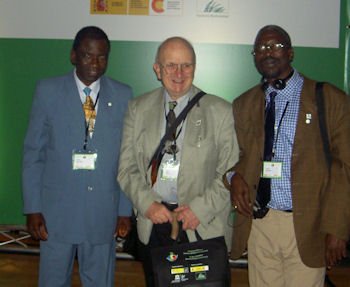
What does this award mean for you?
Willingly or unwillingly, it represents an informal threshold in my life and work, an opportunity to re-assess one’s successes and failures or debts in the study of wetlands and acquisition of scientifically sound arguments for their conservation and wise use. Last but not least, I feel this award does not belong only to me, but to all my friends and colleagues that actively care about wetlands in the Czech Republic, each one within his/her best competence.
How do you contribute to the implementation of the Convention on Wetlands?
In the early years of the Convention, about 1973, I was one of the actors in the abortive attempt to make communist Czechoslovakia a party to the Convention. The official attitude to it started changing only in 1988, under the pressure of the Czech community of ecologists. But it was as late as 1991 that, with democracy restored, Czechoslovakia became a party to the Convention. This legacy was automatically taken over by the Czech and Slovak republics in 1993, following the separation of these two countries. At present, I am a member of the Expert Group of the Czech Ramsar Committee. As chairperson of the Czech MAB National Committee, I encourage a close cooperation between MAB and Ramsar in my country. For example, in 2002 we jointly organized the EuroMAB and Ramsar conference on the “Role of Wetlands in Biosphere Reserves”. In 2003, I had the honour to participate, together with Tobias Salathé, in the Ramsar/UNESCO mission evaluating the situation in the Ukrainian part of the Danube Delta, where the proposed change of one of the Danube branches (Bystroe) into a navigation channel for big boats threatened areas situated at the centre of this highly valuable Ramsar site (RS) and core zone of MAB´s Biosphere Reserve (BR). In the past, I took part and now am again involved in the evaluation of the management plan for the “Lednice Fishponds” RS. In the Třeboň Basin BR, we maintain good contacts with the Ramsar Centre and the fishponds-oriented Station Gebharts (both at Schrems, Lower Austria).
What worries you in connection with wetlands?
I fear that a lot of people still consider wetlands as an obstacle in the “cultural landscape”, and as a source of troublesome insects and diseases. I am worried by the continuous drainage or land filling of wetlands using different excuses such as “development”. Recently, I find disturbing the labelling of wetlands as dangerous sources of methane – a highly active “greenhouse gas”. Naturally, the budgets of carbon dioxide and methane in different ecosystems, including wetlands, require our attention. At the same time, however, it is necessary to trace the fate of these gases before they reach the high atmosphere. In my opinion, this will show that methane from wetlands is much less important for the greenhouse effect than some technocratically oriented people claim it to be. I expect that the changes in the heat and water balance over large areas deprived of their water and vegetation by human interventions do more to promote global warming than the undoubtedly increasing greenhouse effect. In any case, wetland conservation and restoration represent a useful tool for retarding the global warming. This idea ought to be transmitted to decision-makers at all levels.
Aside from your own efforts, how does your work in general contribute to the implementation of the Convention?
My special field of interest is broadly conceived production ecology of wetlands and plants inhabiting wetlands. Our employment of the ecosystem approach is essential for understanding the functioning of wetlands. It is only on that basis that we can correctly assess the structure and biodiversity of wetlands and the sustainability of the wise use and conservation of particular wetlands, as they are postulated by the Convention.
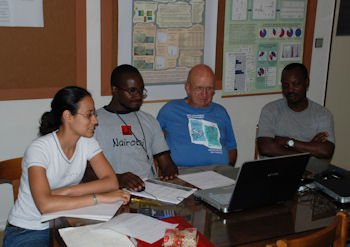
You maintain good contacts with young people, especially students. Do you believe that the new generation is aware of the values of nature and acknowledges the importance of the nature, and particularly wetland, conservation?
In this respect, I am simultaneously both sceptical and optimistic. My scepticism is based on the fact that only a minority of the young generation appreciates the ideas of sustainable life and thus also the conservation and wise (= sustainable) use of wetlands. My optimism, on the other hand, is derived from my experience with the above-mentioned minority of nature- and environment-conscious young people. I believe they will not be afraid, even if they acquire influential positions, to oppose the opinion of the consumer-oriented majority. I believe this hope is justified with most of the students I have come across during my university teaching both in my country and abroad.
What is the most essential principle for you and what do you consider to be the most important for a happy human life?
I try to follow the principal Christian commandments “You shall love the Lord your God with all your heart and with all your soul, and with all your mind”, and: “You shall love your neighbour as yourself “. (Matthew 22, 37-39) Naturally, I acknowledge that I am far from implementing these commandments completely and perfectly. Essential for making human life happy and fruitful is mutual understanding. I have always been lucky in this respect. I got the necessary support and stimulation by my parents and grandparents, by friends whom I had met at grammar school, during my university studies and at work. A favourable environment developed also in the young hikers´ club which we managed to set up in a Boy Scouts-like way even in the difficult 1950s, when Scouting was officially banned. For the past 43 years, my dear and excellent wife Radka has been a great support to me. So have been, too, our two daughters with their families. Last but not least, I have always had friendly and understanding bosses as well as collaborators in my research and science policy activities.
Do you have any unfulfilled dream?
Yes I do, although one dream, namely that about the end of the communist rule in my country, became true 19 years ago. Unfulfilled will remain my dream of my being so rich that I could establish a laboratory for complex ecological research of wetlands, with some 10 to 15 qualified researchers specializing in different fields. I do know about such people, but I do not know where to find the necessary funds.
Do you have any favourite wetlands?
Yes, I have a few of them. In the first place, it is the National Nature Reserve (NNR) of Červené blato (Red Mire), which belongs to the Ramsar site “Mires of Třeboň” in the Třeboň Basin BR. In South Moravia, I like the National Nature Reserve and RS “Fishponds of Lednice” where my Moravian colleagues and I, all in a hard-working team, spent the “golden era” of wetland research within the IBP. Among the wetlands in other European countries, my favourites are the cross-boundary BR and RS of the lake Neusiedler See/Fertő (Austria/Hungary) and the Danube Delta (Romania/Ukraine). This year, I was greatly impressed by the mires I visited in Estonia and Finland. Overseas, I perhaps like most of all the wetlands in and westward from the Mississippi delta and the Everglades NP and RS in Florida.
Your favourite plants?
My favourite wetland plants are the common reed (Phragmites australis) and purple loosestrife (Lythrum salicaria) as well as the Ericales occurring in wetlands. Outside the wetlands, I like all species of gentians (Gentianaceae).
Your favourite animals?
In wetlands, they are both the white and black stork (Ciconia) as well as newts. At home, my favourite animals have been our dogs. Two of them do not live any more, the third one has just come out of the puppy age. Different dog races have been blended in all our dogs.
Your favourite writer?
It is the famous Czech writer Karel Čapek (1890 - 1938).
Your hobbies?
As long as I could walk well, I practiced hiking and cross-country skiing, as a young man also orienteering. Now, I must be satisfied by cycling, mostly to my work and back. My favourite past-time occupation is the listening to any good music. Out of the visual arts, I particularly admire good landscape paintings.
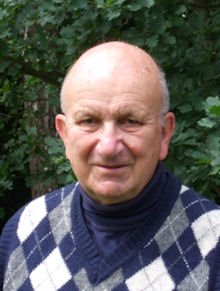
Which is your favourite destinations abroad?
I have several of them. Let me first name the United Kingdom, especially Oxford, where I spent an unforgettable period of 15 months in the past. Then follow The Netherlands with their both sober and pleasant atmosphere and Poland with its brave people. The Dalmatian and Istria coasts in Croatia with Slovenia under way are my favourite places for relaxation. My permanent love that will never rust is Slovakia with its mountains. In all these countries, but also in others, there are a good many people or even friends whom I always enjoy to meet.
Which international and national scientific bodies or programmes and projects have you worked for?
Apart from the already mentioned IBP (in which I was the deputy scientific coordinator of the Production Processes section and coordinator of the IBP Wetlands Working Group), MAB programme and the Convention, it is the INTECOL Wetlands Working Group which I co-founded (with R. E .Turner and others) in 1978 as a continuation of the IBP Wetlands Working Group (1970-74). Also, it was the steering committee of the SCOPE project on “Ecosystem Dynamics in Continental Wetlands and Shallow water Bodies” (1979-85), whose activities resulted in the publication of two volumes edited by the steering committee headed by B.C.Patten. At times, I also collaborated with Wetlands International by co-organizing and teaching at training courses taking place in the Czech Republic. Many times since 1983, I have taught the production ecology of wetlands at the UNESCO Postgraduate Training Courses in Limnology organised by the Austrian and Czech Academies of Science, later also by the UNESCO-IHE university of Delft, The Netherlands. For the Austrian Academy of Sciences, I served for several years as deputy chairperson of the council supervising the Academy’s Institute of Limnology at Mondsee. Stimulating for my mind was my participation in the EU research projects “Eureed I and II” (1993-98) trying to explain the decline of common reed stands in heavily eutrophicated habitats.
Within the Czech Republic, I was a member of the national committees for the IBP and SCOPE and still work for the Czech MAB national committee and the Czech Ramsar Committee. For some time, I was a member of the Czech Academy of Sciences scientific council, the council for natural sciences of the Czech Science Foundation, and the governmental accreditation commission for the Czech universities. Never will I forget my two-year (1990-92) membership of the Czech National Council (= parliament) and its two committees: one for the environment and the other for science and university education. For 6 years (1994-2000), I was active as member of the Třeboň town council and still serve as chairperson of its advisory body for ecological and environmental issues.
Where and when did you spend longer periods of time abroad?
As I have already said, in 1962-63, I spent 15 months in the U.K., mainly at Oxford University’s Department of Agriculture, as a British Council exchange scholar. In 1977, I stayed in the U.S.A. for 4 months, mainly at the LSU Centre for Wetland Resources, Baton Rouge, Louisiana. Apart from the Louisiana wetlands, I visited quite a number of other wetlands in the eastern U.S., from Florida to New York State. For 3 months in 1980, I was active as advisor on the management and control of the cattail Typha domingensisovergrowing numerous small reservoirs in Cuba. In 1996, I was invited to Australia for 7 weeks. I got acquainted with quite a few wetlands in various parts of the country, especially in the Northern Territories, including the Kakadu NP. There I learned about the management of the invasive shrub Mimosa pigra in alluvial wetlands. Apart from all these long-term visits, I have made numerous short- and mid-term visits to various countries – mainly European ones – in connection with my involvement with the IBP, SCOPE or MAB, not to speak about my active participation in a number of symposia and conferences taking place abroad.
Do you have a message for all people with respect to their attitude towards wetlands?
Of all the slogans promoting people’s appreciation of wetlands, I identify myself most closely with the witty slogan: “Wetlands are not waste lands, but wealth lands”.
Thank you for this interview!
Ms. Libuše Vlasáková
Ramsar Administrative Authority
National Focal Point for the Convention in the Czech Republic